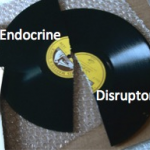I was struck by this large heading on an EPA website, “Rebuilding the Endocrine Disruptor Screening Program.” This program does not need to be rebuilt; it should be eliminated and consolidated with existing programs within the EPA.
endocrine disruptors
Another chemical scare group has a brilliant message: Don't eat at restaurants. The phthalates from plastic wrap and gloves will get you. If you eat at home they still will, just not as fast mega-stupid.
Agent Orange was used as a defoliant during the Vietnam War. A recent paper indicates that the chemicals which comprise AO persist in high concentrations in some pockets of South Vietnam. In addition, they could be causing hormonal imbalances in babies born in those regions.
An interesting finding, that a sunscreen chemical may be useful in treating multiple sclerosis, gave us an unexpected treat: an opportunity to pound the chemical-scares industry. The sunscreen ingredient, homosalate, like just about every other chemical in the world, has been called an "endocrine disruptor" by groups like EWG. Too bad the paper that's cited as proof shows that it's not one at all.
Now that I'm in the second trimester, I'm starting to think about baby bottles, sippy cups, and all that fun stuff. But all the options online leave me thinking I don't have much choice when it comes to BPA-free bottles. And I don't mean lack there of.
Ho hum. Endocrine disruptors again. This time it's from a study in Europe that involves two chemicals and two female reproductive disorders. The only problem is that the study tells us absolutely nothing. The authors should be embarrassed by this paper.
A new study purports to link some pesticides with obesity. Really? This sloppy study, based on both dietary and pesticide exposure while utilizing statistical manipulations and ad-hoc, exposure-intensity criteria, should be relegated to the junkpile of anti-pesticide zealotry.
An opinion piece in the Independent Women s Forum by CEI s Angela Logomasini explores the science behind endocrine disruptors. Summary: there isn t any.
If you believe what you read about BPA and its harmful effects on human health, a topic that we here at ACSH have taken on many times, the latest development from Frederick vom Saal, Professor of Biological Sciences at
Of all the garbage science topics that we routinely cover, among the worst is the concept that miniscule amounts of so-called endocrine disruptors chemicals that supposedly have an adverse impact on human sexual development do anything whatsoever. The plastic component BPA and plastic softeners, phthalates, are the two poster children of the movement, but there are many more.
Kudos to Health Canada (the Canadian equivalent of our FDA) in spite of the fact that Canada was the first country in the world to basically prohibit the use of BPA (bisphenol A) in baby bottles, they continued to do due diligence on the substance.
It s starting to feel a little bit like summer on the East coast now, which means people are clean up their yards and gardens. And that means using chemicals, which according to an op-ed by



